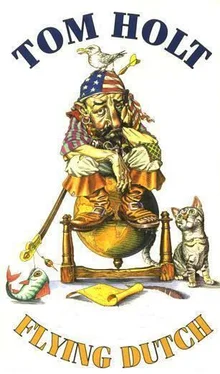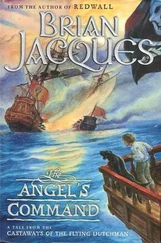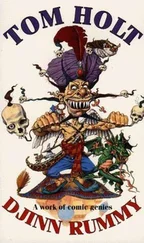Tom Holt - Flying Dutch
Здесь есть возможность читать онлайн «Tom Holt - Flying Dutch» весь текст электронной книги совершенно бесплатно (целиком полную версию без сокращений). В некоторых случаях можно слушать аудио, скачать через торрент в формате fb2 и присутствует краткое содержание. Год выпуска: 1991, Жанр: Фэнтези, Юмористическая проза, на английском языке. Описание произведения, (предисловие) а так же отзывы посетителей доступны на портале библиотеки ЛибКат.
- Название:Flying Dutch
- Автор:
- Жанр:
- Год:1991
- ISBN:нет данных
- Рейтинг книги:5 / 5. Голосов: 1
-
Избранное:Добавить в избранное
- Отзывы:
-
Ваша оценка:
- 100
- 1
- 2
- 3
- 4
- 5
Flying Dutch: краткое содержание, описание и аннотация
Предлагаем к чтению аннотацию, описание, краткое содержание или предисловие (зависит от того, что написал сам автор книги «Flying Dutch»). Если вы не нашли необходимую информацию о книге — напишите в комментариях, мы постараемся отыскать её.
Flying Dutch — читать онлайн бесплатно полную книгу (весь текст) целиком
Ниже представлен текст книги, разбитый по страницам. Система сохранения места последней прочитанной страницы, позволяет с удобством читать онлайн бесплатно книгу «Flying Dutch», без необходимости каждый раз заново искать на чём Вы остановились. Поставьте закладку, и сможете в любой момент перейти на страницу, на которой закончили чтение.
Интервал:
Закладка:
“‘Think of a number,” he replied, “then double it. I can afford it, rest assured.”
“‘Who are you, then?” I asked.
“‘Does it matter?” he said.
“‘No,” I replied, “I’m just incurably nosy.” Which is true, as it happens.
“‘My name’s Juan de Montalban, but I trade as Fortunatus Magnus,” he said, with just a hint of pride. “You’ve probably heard of me.”
“I mumbled something about how out of touch you get in my business, but I could see he was disappointed. It’s true, though; you do lost track of things when you spend most of your life surrounded by hundreds of miles of open sea. Oh yes.”
“‘Well,” he said, “if you must know I’m an alchemist.”
“You mean cures for headaches and things?” I said.
“‘Certainly not,” he replied. “I am a philosopher, and I have discovered, the answer to the riddle of transmigration of the elements.”
“I was startled. “Base metal into gold and all that sort of thing?” I said. He sneered slightly.”
“‘That’s transmutation, not transmigration,” he said. “Vulgar party trick, though it pays the rent, I’ll grant you. I do that, too.”
“Suddenly I could understand why he wanted to get out of Spain in such a hurry. Apart from being incredibly hard on heretics—and alchemists are heretics by definition—the Spanish had a peculiar horror of anything which might disrupt the nice little monopoly on gold and silver they’d been enjoying ever since Cones came back from the Americas. Have you ever been to America? Funny place. You can’t get a decent boiled egg for love nor money.”
“‘Be that as it may,” he said, “I’ll give you five thousand pistoles for a ride to Bristol. Good Spanish coin,” he added, “I wouldn’t try and palm you off with the home-made stuff.”
“By now my natural scepticism was telling me that alchemists you meet in taverns at the end of a long, difficult day may well turn out not to be alchemists at all, particularly if they end up trying to borrow money or sell you a lump of cut-price gold; but there was something unusually convincing about him—probably the way he wasn’t trying to convince me. Do you see what I’m getting at, by any chance?”
The young German nodded. He saw only too well.
“So,” continued the stranger, “I said that if he showed up at the quay next morning with five thousand pistoles I’d take him to England with the greatest of pleasure, and then I went off to get drunk in slightly less eccentric company. I was so successful in this—getting drunk is one of the things I’m best at—that I didn’t get up till quite late the next morning, and I reckoned that even if he’d kept the appointment he’d have given up and gone away long since. But when I got down to the quay at about half-past ten—I had some business to see to in the town first—there he was, looking extremely nervous and asking what the hell had kept me.”
“I explained about my bad headache, but he didn’t seem terribly interested. He did, however, seem extremely anxious to show me a large number of very genuine-looking gold coins, and I decided that even if he was a lunatic he was a rich lunatic, and that if he wanted to go to Bristol then I wanted to take him there, before any unscrupulous character turned up who might exploit the man’s mental frailty by asking for six thousand pistoles.”
“My crew were by no means overjoyed to be off again so soon, and when I told them that we were going to England they made some very wounding remarks about my intelligence. They pointed out, perfectly accurately, that Sir Francis Drake was English, and so were John Hawkins and Black Jack Norris, and that a country capable of producing such unsavoury characters was somewhere they were in no hurry to visit. In fact, so determined were they that I had to take the unprecedented step of promising to pay them before they would do any work at all.”
“Their fears turned out to be absolutely groundless. Sir Francis and his fellow merrymakers were far too busy chivvying honest businessmen off Puental to bother us, and an unusually obliging wind took us right up to the mouth of the Bristol Channel.”
The stranger hesitated for a moment. “You don’t really want to hear the rest of this,” he said. “I think it would be much better if we go back to discussing kings. Take Charlemagne, for instance. Did you know that Charlemagne didn’t learn to read until he was forty?”
“Never mind Charlemagne,” said the young German. “Go on with what you were saying.”
“I’d really much rather talk about Charlemagne,” said the stranger, “if it’s all the same to you. Believe me, I have very good reasons.”
The young German said something vulgar about Charlemagne, and the stranger shrugged and went on.
“It was then,” he said, “that things started to go wrong. The unusually obliging wind went away again, leaving us stranded in mid-sea with nothing to do but look at the coastline of Wales, which is not something I would recommend unless you have an overwhelmingly keen interest in geology. To make matters worse, something unsavoury got into the ship’s beer, and when you put twenty Dutchmen on a ship—did I mention we were mostly Dutch? Well, we were—when you put twenty Dutchmen and a Scot on a ship in the middle of the sea with nothing to drink but cloudy beer, then you have a recipe for unpleasantness on your hands.”
“Halfway through the second day we were starting to feel more than usually thirsty, and by that evening the ship was alive with parched mariners in search of hidden caches of the right stuff. Me among them, I might add; I had an idea that the answer to the riddle of the transmigration of matter wasn’t the only thing Fortunatus Magnus had in his luggage. You see, he was the only person on board who didn’t seem worried about the beer crisis. When the first mate told him about it, all he said was “So what?” Suspicious, you’ll agree.”
“As soon as I’d got his big trunk open—it didn’t take more than five or six blows with the axe—my suspicions were confirmed; there was this huge glass bottle arrangement, carefully packed with straw and about half-full of the most delicious-looking tawny-yellow liquid you ever saw in your whole life. I closed what was left of the lid of the trunk and went in search of privacy and a tankard.”
“The tankard was no problem at all; but more or less the only privacy you can find on my ship is in the crow’s nest, which is why I tend to spend a lot of time there. Even then, I wasn’t going to take any chances, since the crow’s nest is directly above the beer-barrel—we keep it permanently on deck, where everyone can see it; just knowing it’s there can be a great help at times of stress—and there was a crowd of indomitable optimists gathered round it trying to fine the repulsive mess with Irish moss and fishmeal. I pulled the rope ladder up after me, uncorked the bottle, and poured myself a drink.”
“It tasted odd to start with, but it had a certain something, and after the third tankard I was feeling much more relaxed and in tune with the music of the spheres. Just then the alchemist appeared on deck, looking absolutely livid, like a sort of manic cormorant. I reckoned I knew why, but by then of course I couldn’t care less.”
“He started telling about how someone had broken into his trunk and stolen something of great value, and of course I was grinning all over my silly face with pleasure. Nobody was taking much notice of him apart from me, because a couple of the crew had just put another cupful of Irish moss in the beer-barrel and were peering anxiously at it to see if it would do any good. Funny stuff, Irish moss—I think it’s made up of ground-up fish bones, and I haven’t the faintest idea why…Sorry, you’re right, I do tend to wander off the subject from time to time. It’s probably subconscious.”
Читать дальшеИнтервал:
Закладка:
Похожие книги на «Flying Dutch»
Представляем Вашему вниманию похожие книги на «Flying Dutch» списком для выбора. Мы отобрали схожую по названию и смыслу литературу в надежде предоставить читателям больше вариантов отыскать новые, интересные, ещё непрочитанные произведения.
Обсуждение, отзывы о книге «Flying Dutch» и просто собственные мнения читателей. Оставьте ваши комментарии, напишите, что Вы думаете о произведении, его смысле или главных героях. Укажите что конкретно понравилось, а что нет, и почему Вы так считаете.



![Brian Jacques - [Flying Dutchman 01] - Castaways of the Flying Dutchman](/books/128851/brian-jacques-flying-dutchman-01-thumb.webp)








